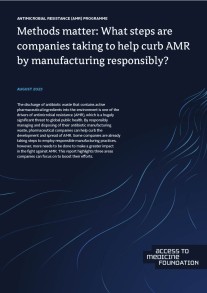Methods matter: What steps are companies taking to help curb AMR by manufacturing responsibly?
Date
22 August 2023
Antimicrobial resistance (AMR) already kills millions of people worldwide each year, and this urgent global health threat is rising faster than predicted. Among the drivers of drug resistance is the release of antibiotic waste into the environment. Specifically, if waste generated from antibiotic manufacturing contains high levels of active pharmaceutical ingredients (APIs) when discharged into rivers and waterways, it poses a serious risk to the emergence and spread of AMR.
Since releasing the first AMR Benchmark in 2018, the Access to Medicine Foundation has been tracking how pharmaceutical companies have engaged in efforts to help curb drug resistance – including by manufacturing responsibly. Despite progress towards responsible manufacturing, significant gaps remain.
This new report from the Foundation’s Antimicrobial Resistance Programme focuses on the issue, setting out clear steps companies can take to boost their efforts and limit AMR risk from manufacturing more effectively.
By assessing positive examples from selected companies of varying sizes that manufacture and market antibiotics, the report identifies opportunities for progress that their peers can follow. The report specifically mentions Abbott; Aurobindo; Centrient; Fresenius Kabi; GSK; Pfizer; Novartis and its generics division, Sandoz; Shionogi; Teva; and Viatris.
What’s in the report?
The impact pharmaceutical companies can have: Companies that hold market authorisations for antibiotics are uniquely positioned to drive change across the antibiotic supply chain, and can help transform the industry. Not only can they prioritise responsible manufacturing at the manufacturing sites they own and operate, but they have the ability to influence the standards and practices of the various third-party suppliers they contract in the production of their lifesaving medicines.
Up-to-date, best-in-class examples: The report highlights examples from companies that are taking progressive action to limit AMR risk from manufacturing – both at their own sites and those of their suppliers – demonstrating how companies can prioritise responsible manufacturing. However, for industry-wide change to take effect, more companies will need to act.
What companies can do next: To support and enable progress, this report sets out three key areas companies can focus on to develop and expand responsible manufacturing practices. Tailored recommendations within each key area guide leading companies on how to boost current efforts and show other companies how they can step up.
Beyond curbing AMR: The report also demonstrates how proactively adopting and scaling responsible manufacturing practices – and being transparent about these practices – is a critical way for companies to safeguard their business for the future, especially considering how the global policy and procurement landscapes are shifting.
About the Antimicrobial Resistance Programme
This report is part of the Access to Medicine Foundation’s Antimicrobial Resistance (AMR) Programme, which works to move pharmaceutical companies in responding to the growing challenge of drug-resistant infections. The AMR Programme’s publications – including both the AMR Benchmark (published in 2018, 2020 and 2021) and targeted thematic reports such as this – focus on how pharmaceutical companies perform in terms of taking action on identified priorities to address AMR.

Marijn Verhoef
Director of Private Sector Engagement
mverhoef@accesstomedicinefoundation.org
Get in touch
